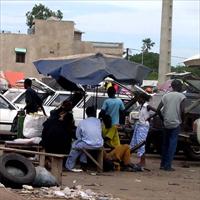SENEGAL: Dakar on less than $5 a day

While driving a rusty old yellow taxi through Dakar’s potholed streets looking for customers, Abdou Ndoye told IRIN how he and his family of nine gets by on the 2,000 CFA francs [US$4.80] he makes a day.
"Sometimes we eat more, other times less,” he shouted above the noise of the car’s rattling engine. “But we never go hungry. We make the money go far."
Global food prices have risen astronomically in recent months and the cost of fuel has eaten into the earnings of millions of low-income earners such as Ndoye.
“I am spending a third more on fuel than I was a few months ago,” he said, “so I just have to work harder.”
Last month he said he brought home around 60,000 CFA francs (US$144). Almost half that went to school fees for the three younger children in his home. “So all we had left was about 30,000 CFA francs [US$72] and somehow that had to go round,” he said.
Thankfully he doesn’t pay rent. “My cousin in France covers that,” he said. Still, Ndoye has expenses such as electricity and water that must come out of the US$72. The little that is left goes to food.
He tries to buy some meat, fish and vegetables for the family but he said most of the money in fact goes to cooking oil and rice, the country’s staple. A 50kg sack is the minimum quantity his family needs each month, he said.
Ndoye stopped his taxi for a man who turned out to be a friend. He gets in and the conversation quickly turns to food prices “Everyone I know is talking about demonstrating,” said the friend, El Hadj Fall. “They don’t know how else to make the government pay attention.”
People in Senegal, Cote d’Ivoire, Guinea, Burkina Faso and Cameroon have protested over the rising cost of commodities and many of those protests have turned violent. At least one demonstrator was killed in Cote d’Ivoire’s commercial capital Abidjan last week.
“I just paid 13,000 CFA francs [US$31.20] for a sack of rice,” Fall, the friend, said. Ndoye responded saying he bought a sack of rice a month ago for US$20 and has held off purchasing one this month. "I want to wait and see if the government will make the price come down again," he said.
Fall got out near a fruit stand and Ndoye used the opportunity to buy some bananas. He took a bunch and offered the woman seller 400 CFA francs [US$0.96]. She leaned back and laughed. “No, no,” she said. “These days bananas are twice that much.”
Ndoye drove off mumbling about how he had been ripped off.
Next he is waved down by a man in a suit and tie. He and Ndoye haggle over the price before the man gets in.
“I rarely even take taxis these days as they’re so expensive,” the man, Sembou Dial, told IRIN. He said he earns a comparatively good salary at a private security company. “But even I can’t afford nice things anymore.”
Ndoye pitched in, "I can’t even buy clothes for the family."
He also said he cannot afford to fix the window that was cracked in his taxi or the rust which is getting worse by the day.
But after the passenger got out, Ndoye seemed more philosophical. “We Senegalese are resourceful people and we will always find a way,” he said. “We just have to keep working harder.”
Then there was a pause and he added, “But maybe soon it will all become too much.”
 Back and Next - Back and Next
Back and Next - Back and Next See Also - See Also
See Also - See Also